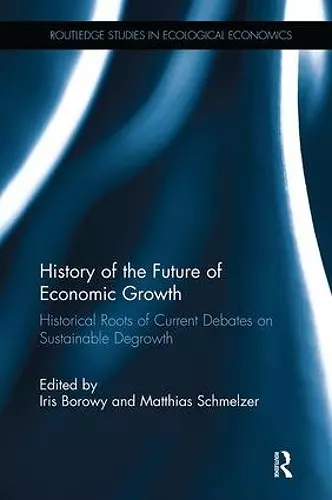History of the Future of Economic Growth
Historical Roots of Current Debates on Sustainable Degrowth
Matthias Schmelzer editor Iris Borowy editor
Format:Paperback
Publisher:Taylor & Francis Ltd
Published:8th Mar '18
Currently unavailable, and unfortunately no date known when it will be back
This paperback is available in another edition too:
- Hardback£160.00(9781138685802)

The future of economic growth is one of the decisive questions of the twenty-first century. Alarmed by declining growth rates in industrialized countries, climate change, and rising socio-economic inequalities, among other challenges, more and more people demand to look for alternatives beyond growth. However, so far these current debates about sustainability, post-growth or degrowth lack a thorough historical perspective.
This edited volume brings together original contributions on different aspects of the history of economic growth as a central and near-ubiquitous tenet of developmental strategies. The book addresses the origins and evolution of the growth paradigm from the seventeenth century up to the present day and also looks at sustainable development, sustainable growth, and degrowth as examples of alternative developmental models. By focusing on the mixed legacy of growth, both as a major source of expanded life expectancies and increased comfort, and as a destructive force harming personal livelihoods and threatening entire societies in the future, the editors seek to provide historical depth to the ongoing discussion on suitable principles of present and future global development.
History of the Future of Economic Growth is aimed at students and academics in environmental, social, economic and international history, political science, environmental studies, and economics, as well as those interested in ongoing discussions about growth, sustainable development, degrowth, and, more generally, the future.
'Borowy and Schmelzer’s book adds a great deal of historical understanding to the subjects of economic growth, social inequality, and social movements in an age where climate change and declining resource quality will make these problems even more difficult to solve.' — Kent Klitgaard, Professor of Economics Wells College Aurora, New York, USA
‘In this volume a handful of historians put the concept of economic growth under the microscope. Their work, accessible to any reader, bristles with insights concerning the origins of the ambition of economic growth, the implications of that ambition for our times, and the clouded future of economic growth. Taken together it offers a new perspective on a crucial subject.’ — J.R. McNeill, Georgetown University, USA
'This book traces the history of the growth paradigm as well as the history of its critique. It is a must-read for anyone interested on alternatives to a one-way future consisting only of growth.' — Giorgos Kallis, ICREA Professor of Ecological Economic, Autonomous University of Barcelona, Spain
‘A new generation of European and American economic historians, political economists and ecologists, historians of science led by Iris Borowy and Matthias Schmelzer come together in this splendid collection of essays to question the notion of economic growth and even that of sustainable development. They write brilliantly about gold and money, the health of humans, the economy and the environment, issues of science and technology, the cult of GDP growth and its questioning by different though converging schools of "prosperity without growth", Décroissance and Post-Wachstum.’ — Joan Martinez-Alier, Emeritus Professor at ICTA, Universitat Autonoma de Barcelona, Spain
‘Riding the crest of a new wave in the history of economics, this book navigates the fluid landscapes of ideas of economic growth in time and place; a rich resource for historians and economists alike.’ — Glenda Sluga, Professor of International History, University of Sydney, Australia
‘This cutting-edge collection combines scholarly rigor with political urgency: a boon to academics, participants in social movements, and those who seek to bridge the gap.’ — Quinn Slobodian, Associate Professor of History at Wellesley College, USA
ISBN: 9781138499676
Dimensions: unknown
Weight: 317g
200 pages